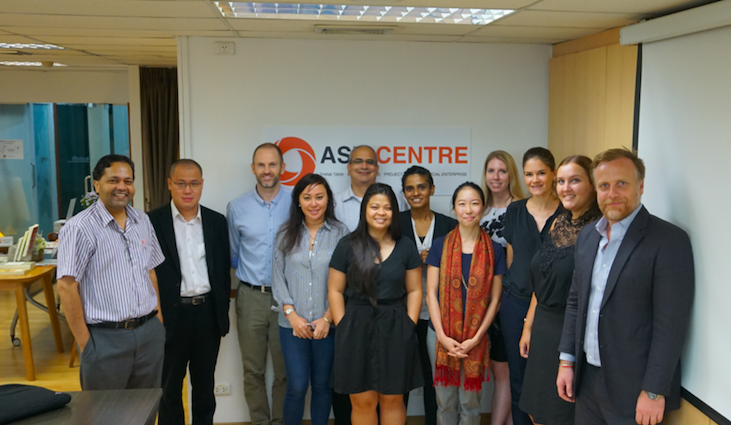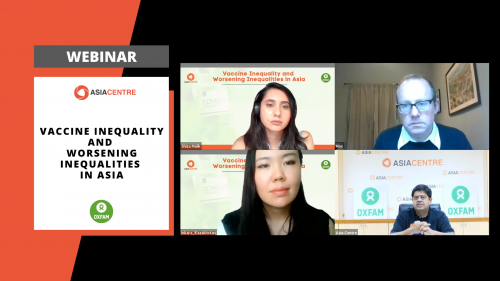
Vaccine inequality is a growing concern in Asia, where the biggest challenge in keeping the pandemic at bay is the vaccination rates of a country. Hence, verified information on vaccine’s efficacy, and the equity of vaccine provision and distribution is important in putting a spotlight on the underlying inequalities that affect efforts to combat the COVID-19 pandemic.
This concern was the main theme of the webinar: “Vaccine Inequality and Worsening Inequalities in Asia” co-convened by Oxfam International and Asia Centre on 24 November 2021, 3:00 PM – 4:30 PM. The event was part of Oxfam International and Asia Centre’s efforts to discuss the issue of vaccine inequality and open the nominations for the 2021-2022 Journalism for an Equitable Asia Award – now in its 3rd year.
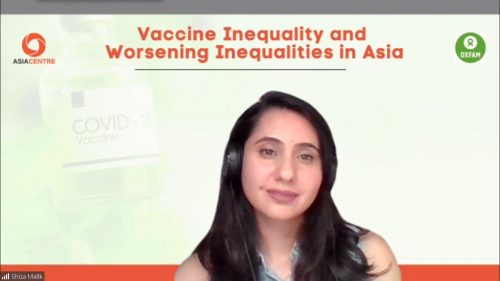 In her opening remarks, Shiza Malik, Regional Communications and Media Leads—Asia, Oxfam International, welcomed the panel with a brief overview of the Journalism for an Equitable Asia project which encourages journalism that highlights inequality in Asia. The focus of the “2021-2022 Journalism for an Equitable Asia Award” is on recognizing works that report on the disparity of vaccine allocation, unaffordable costs of healthcare, and preventable deaths.
In her opening remarks, Shiza Malik, Regional Communications and Media Leads—Asia, Oxfam International, welcomed the panel with a brief overview of the Journalism for an Equitable Asia project which encourages journalism that highlights inequality in Asia. The focus of the “2021-2022 Journalism for an Equitable Asia Award” is on recognizing works that report on the disparity of vaccine allocation, unaffordable costs of healthcare, and preventable deaths.
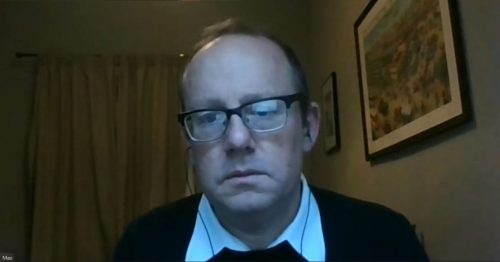 Max Lawson, Head of Inequality Policy, Oxfam International, explained that COVID-19 pandemic has worsened economic inequalities: rich countries were getting more vaccines and recovering faster in a big part from hoarding the vaccines. Existing patent models have also helped pharmaceutical companies to profit from and limit access to vaccines that were developed with taxpayers’ money. Consequently, he urged the need for small countries to have the capacity to acquire or manufacture cheap, license-free vaccines.
Max Lawson, Head of Inequality Policy, Oxfam International, explained that COVID-19 pandemic has worsened economic inequalities: rich countries were getting more vaccines and recovering faster in a big part from hoarding the vaccines. Existing patent models have also helped pharmaceutical companies to profit from and limit access to vaccines that were developed with taxpayers’ money. Consequently, he urged the need for small countries to have the capacity to acquire or manufacture cheap, license-free vaccines.
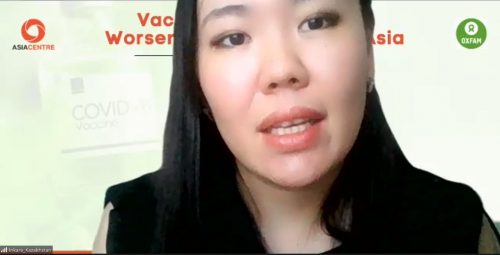 Inkara Mukatova, Program Officer, Civil Society Development Association, gave an overview of the COVID-19 situation in Central Asia. Disinformation on death rates and quality of vaccines has hidden the true extent of the problem in the region and has created vaccine hesitancy among Central Asians. The geopolitics of the region has also meant that governments’ hands are tied with Russian and Chinese vaccines which may not be as effective as others. What would help Central Asia is commitments and cooperation on a global level that ensures access to effective vaccines to those most in need.
Inkara Mukatova, Program Officer, Civil Society Development Association, gave an overview of the COVID-19 situation in Central Asia. Disinformation on death rates and quality of vaccines has hidden the true extent of the problem in the region and has created vaccine hesitancy among Central Asians. The geopolitics of the region has also meant that governments’ hands are tied with Russian and Chinese vaccines which may not be as effective as others. What would help Central Asia is commitments and cooperation on a global level that ensures access to effective vaccines to those most in need.
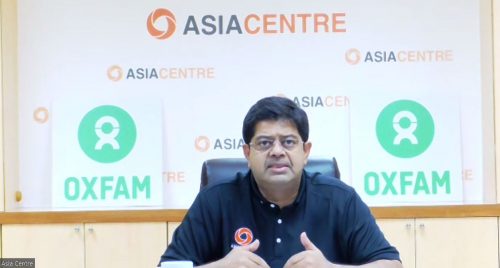 Dr.James Gomez, Regional Director, Asia Centre, presented a regional overview that showed the correlation of vaccination rates and death rates in Asian countries. Apart from differences in vaccination rates between sub-regions in Asia, he also pointed to the challenges and discrepancies within countries when accessing vaccines. He stressed the need for comprehensive plans to provide vaccines in preventing additional COVID-19 related deaths.
Dr.James Gomez, Regional Director, Asia Centre, presented a regional overview that showed the correlation of vaccination rates and death rates in Asian countries. Apart from differences in vaccination rates between sub-regions in Asia, he also pointed to the challenges and discrepancies within countries when accessing vaccines. He stressed the need for comprehensive plans to provide vaccines in preventing additional COVID-19 related deaths.
Thereafter, Dr. Gomez introduced the 2021-2022 Journalism for an Equitable Asia Award. He said the nominations are open now and the submission deadline is on 31 January 2022. Eligible journalists must have published two or more pieces about healthcare inequality between 1st January 2021 and 31st January 2022, and the articles submitted for nomination should be at least 650 words in length, in English. Nominated articles will be judged by a Judging Panel of media and inequality experts, representatives from the Asia Centre, Oxfam International, and independent practitioners. The top 3 winners will receive cash awards, the top 10 journalists will be invited to participate in the awards ceremony, and merit certificates will be given to the journalists ranked from 11st to 15th places. The award ceremony will be held on 22 March 2022 in Bangkok, Thailand.
Discussion during the Q&A largely centred on the role of journalism. It was recognised that journalists can be part of wider efforts by local communities and civil societies to ensure fact-based understanding of vaccines. Additionally, it was noted that journalists can shed light on attempts by governments to manage information during the pandemic. Hence, journalists and the media can hold governments to account even as they try to silence criticism.
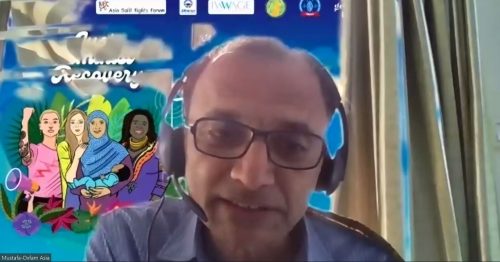 In his closing remarks, Mustafa Talpur, Regional Advocacy and Campaign Leads—Asia, Oxfam International, highlighted the importance of journalists picking up people’s concerns and bringing them to the spotlight. In this way, he said, journalists can help pave way for a more equitable Asia.
In his closing remarks, Mustafa Talpur, Regional Advocacy and Campaign Leads—Asia, Oxfam International, highlighted the importance of journalists picking up people’s concerns and bringing them to the spotlight. In this way, he said, journalists can help pave way for a more equitable Asia.
Asia Centre works on human rights issues related to freedom of religion or belief, hate speech and racial discrimination. If you would like to collaborate with the Centre on evidence-based research, co-coveneing activities or other projects. Send an expression of interest to contact@asiacentre.org

